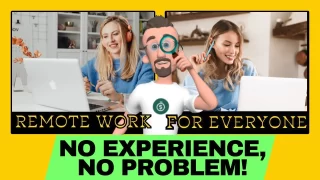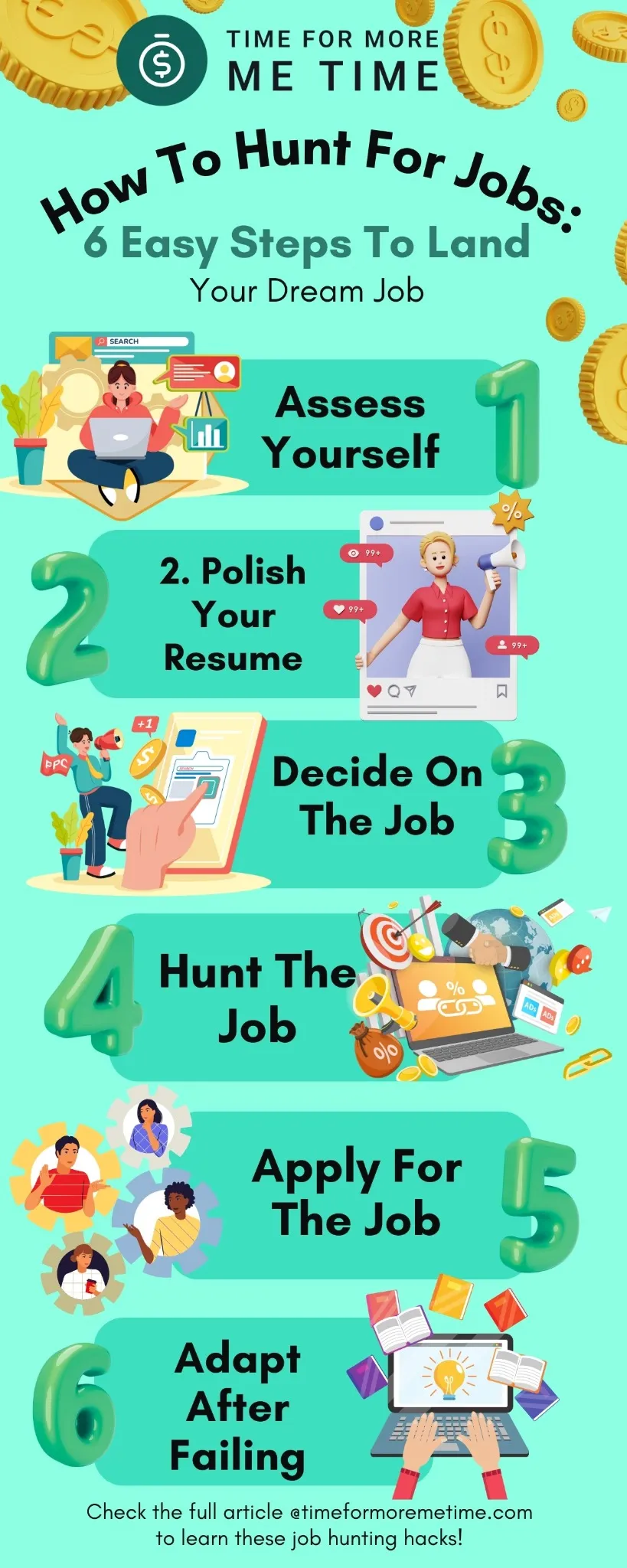
How to hunt for jobs? Been there, done that—countless times! So, why this topic? Well, I’ve been scrolling through my social media accounts lately and noticed a lot of young people tweeting and threading (is that the right term?) about their struggles to find a job.
Some are successful, while others are facing constant rejections—some for an entire year! That’s intense! I felt sad for them and a bit bewildered as well.
When I was in my 20s, there were plenty of jobs to be found. I was hopping from one job to another, even juggling multiple positions at once. So, why are young people today having such a tough time finding work?
Do they feel overqualified? Are they aiming too high? Are hiring managers that strict nowadays? I’m not sure. I couldn’t gather much information from them, but all I could do was encourage them that they would find a job soon.
So, what can I do? I decided to spend some time researching and reflecting on my own experiences to discover ways to make job hunting easier and increase the chances of landing the desired position.
Keep in mind that some of the tips I’ll include here may seem like common sense—and they really are! I’m not suggesting that today’s youth lack common sense, but perhaps they just need a little reminder that there’s a structure to the job search process.
Anyway, I’ll stop rambling and let’s get started!
1. Assess Yourself
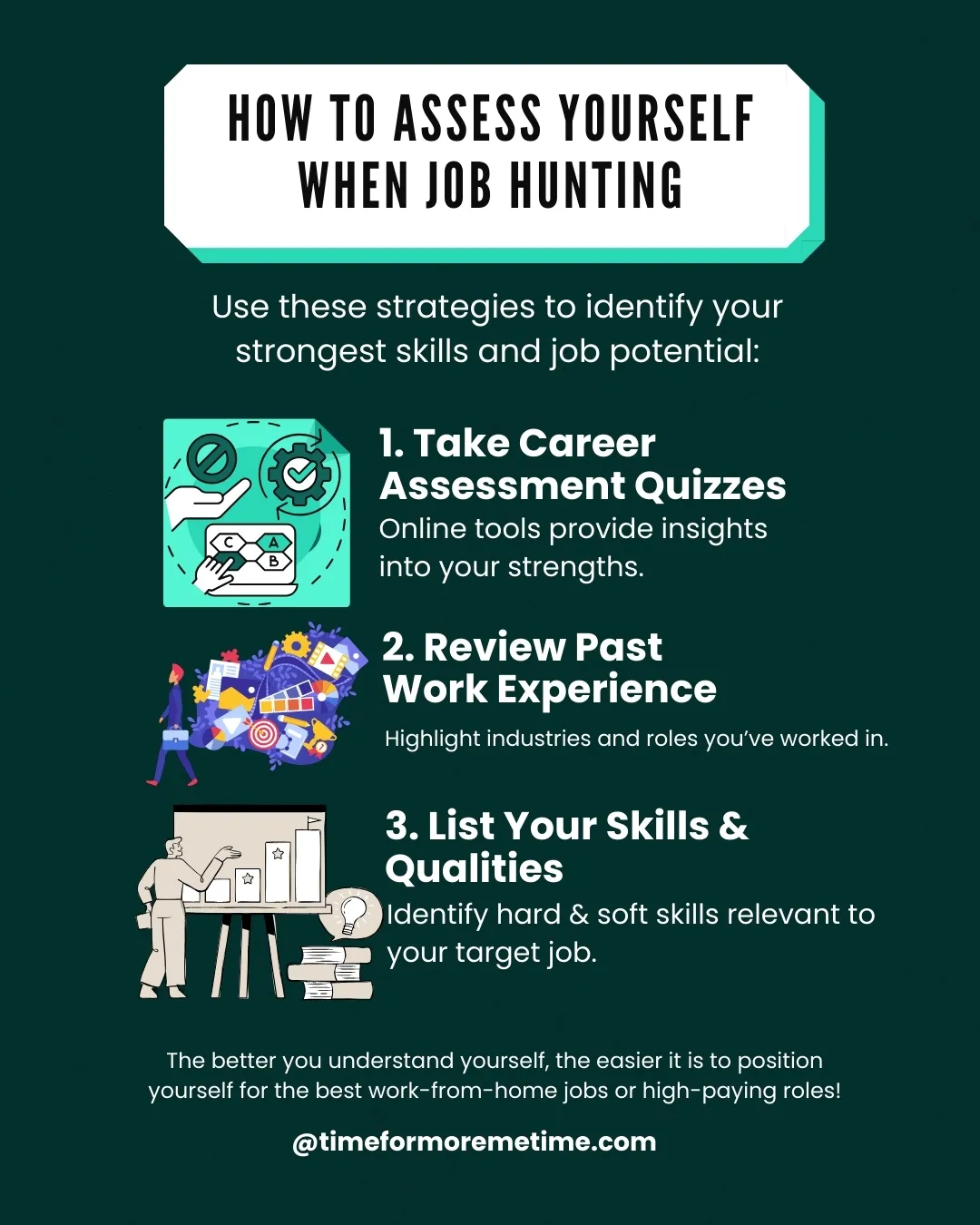
It all starts with self-assessment. Getting a job is essentially like selling a product. In this case, the product is you, and the customer is your potential employer.
To effectively sell a product, you need to understand what problems it solves, what needs it fulfills, and its overall purpose. If you grasp these details, you can effectively communicate to those experiencing the issues that your product addresses.
Similarly, you need to know what you can offer to your potential employer. Once you have that clarity, it becomes a mix-and-match game. The employer who hires you will look for a candidate whose qualities and skills align with their needs.
The more closely your profile matches the job requirements, the higher your chances of getting employed. And if you’re lucky, you may land one of the best-earning work-from-home jobs!
So, how can you achieve this? There are numerous career assessment quizzes and tools available online. You can take these assessments to gain insights into your strengths as a potential employee.
If this isn’t your first job search, be sure to include your prior work experience in your assessment. Highlight the industries and roles you’ve been involved in, as this information will provide valuable context for your skills and qualifications.
2. Polish Your Resume
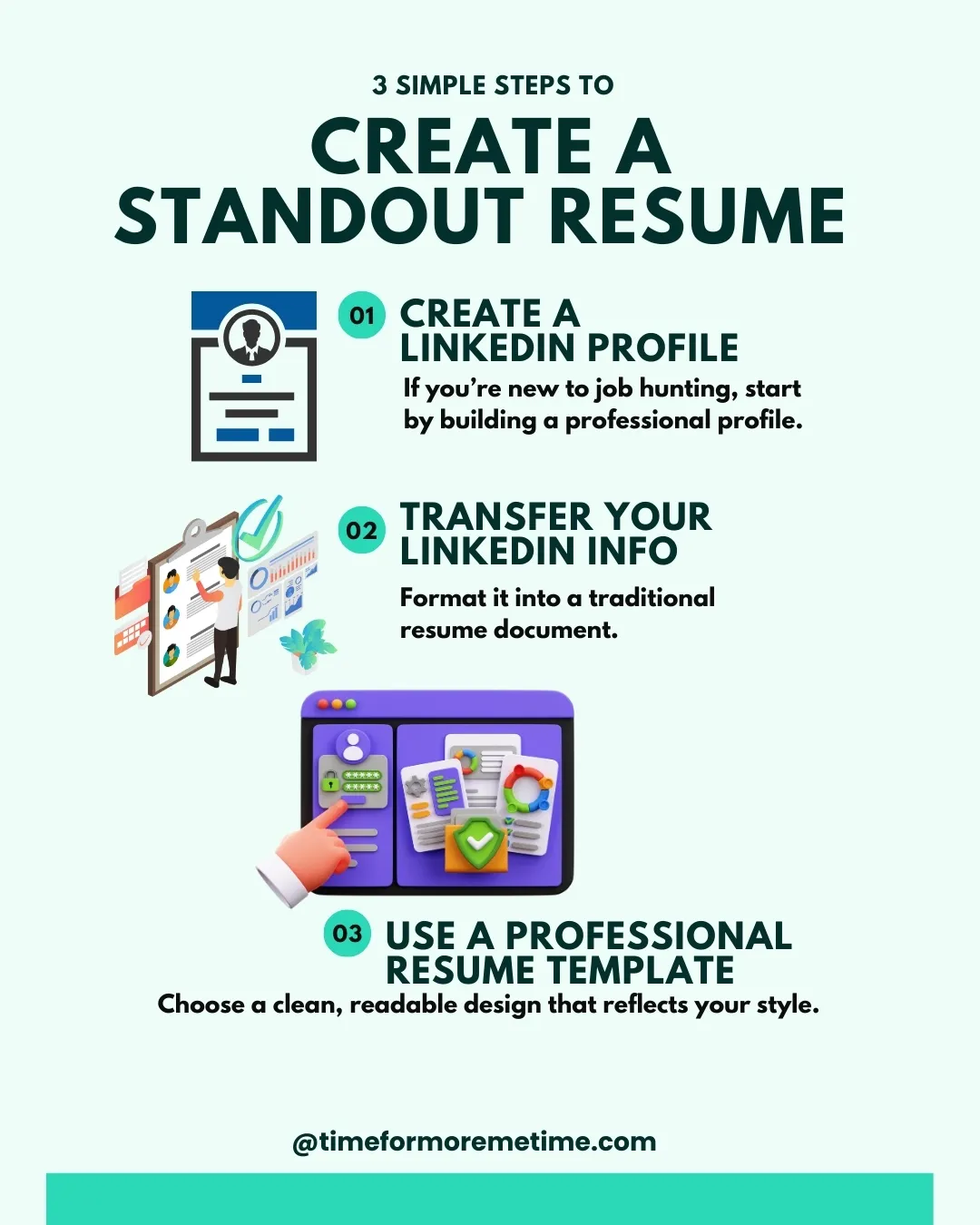
After completing your self-assessment, it’s time to focus on polishing your resume, updating your job profile, and refurbishing your portfolio. If this is your first attempt at job hunting, a great starting point is to create a LinkedIn profile.
Once you’ve crafted your LinkedIn profile, take the next step by transferring all the information from your profile into a document. Format it to resemble a traditional resume, ensuring it highlights your skills, experiences, and accomplishments effectively.
There are countless resume templates available online that you can use to design your resume, making it visually appealing and easy to read. Choose a template that reflects your personal style while maintaining a professional appearance.
As you format your resume, remember to include key sections such as the following:
- Contact information
- Compelling summary or objective statement
- Work experience
- Education
- Relevant skills
Tailor each section to showcase your strengths and align with the job you’re targeting. Additionally, consider adding a section for certifications, volunteer work, or projects that demonstrate your expertise and commitment to your field.
A well-organized and polished resume will not only capture the attention of potential employers but also convey your professionalism and readiness for the job market.
3. Decide On The Job
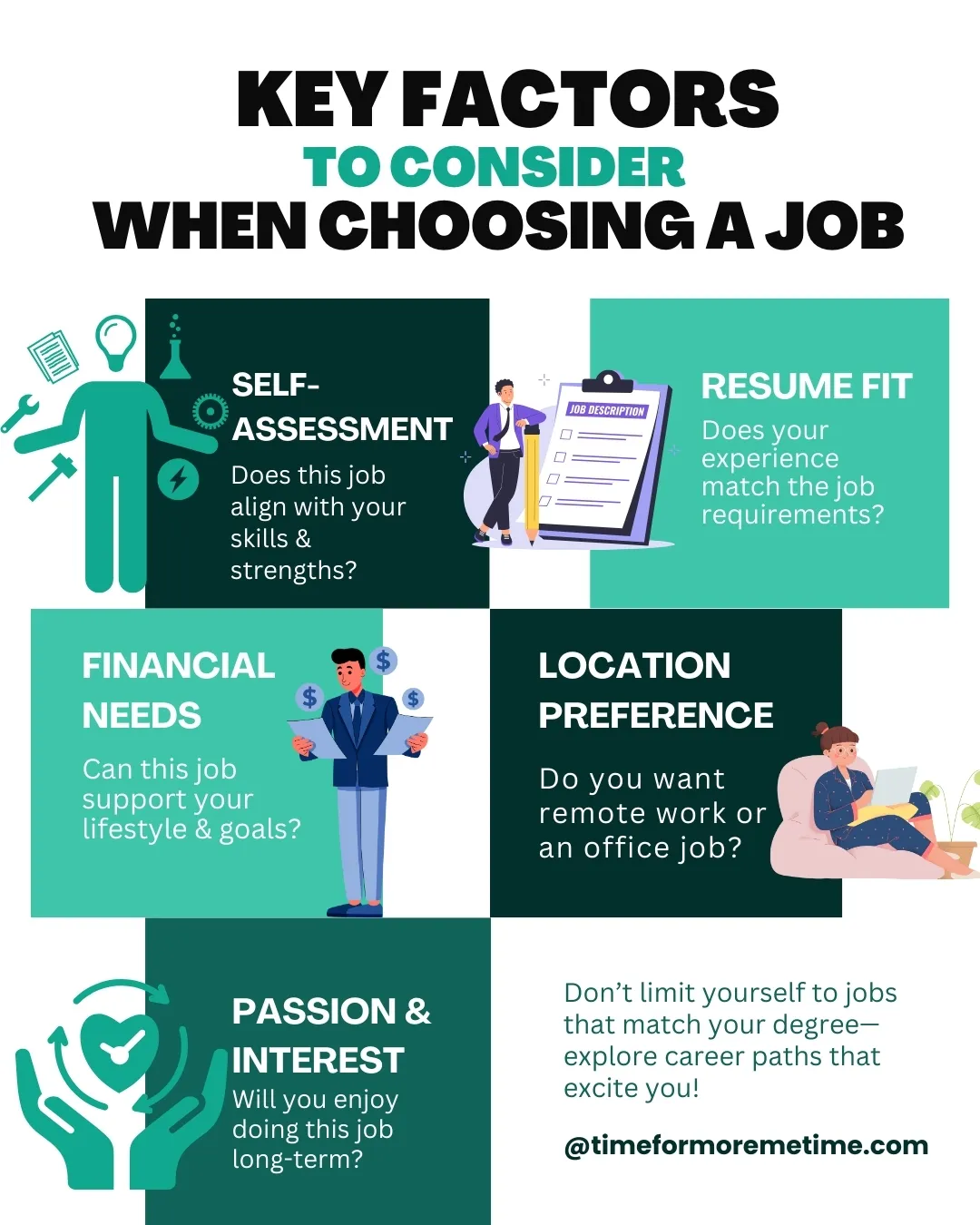
In many cases, the type of job a person applies for is influenced by the college course they completed or the educational achievements they have attained.
However, it’s important to remember that this is just one aspect of the decision-making process when it comes to choosing the right job for you. Don’t overlook the significance of your self-assessment, your polished resume, your financial needs, your preferred location, and, most importantly, your passion.
While aligning the job you desire with your passion may not necessarily increase your chances of landing the position, it does ensure that you are more likely to find interesting jobs that pay well. This alignment can lead to greater job satisfaction and a longer tenure in your role.
Take the time to explore various career options that resonate with your interests and values. Consider industries and roles that excite you, even if they differ from your educational background.
Research potential job markets and evaluate how your skills can be applied in different contexts.
Additionally, think about your financial requirements and how they align with your career aspirations. It’s essential to find a balance between pursuing your passion and meeting your financial obligations.
Ultimately, the job you choose should reflect a combination of your skills, interests, and practical considerations.
4. Hunt The Job
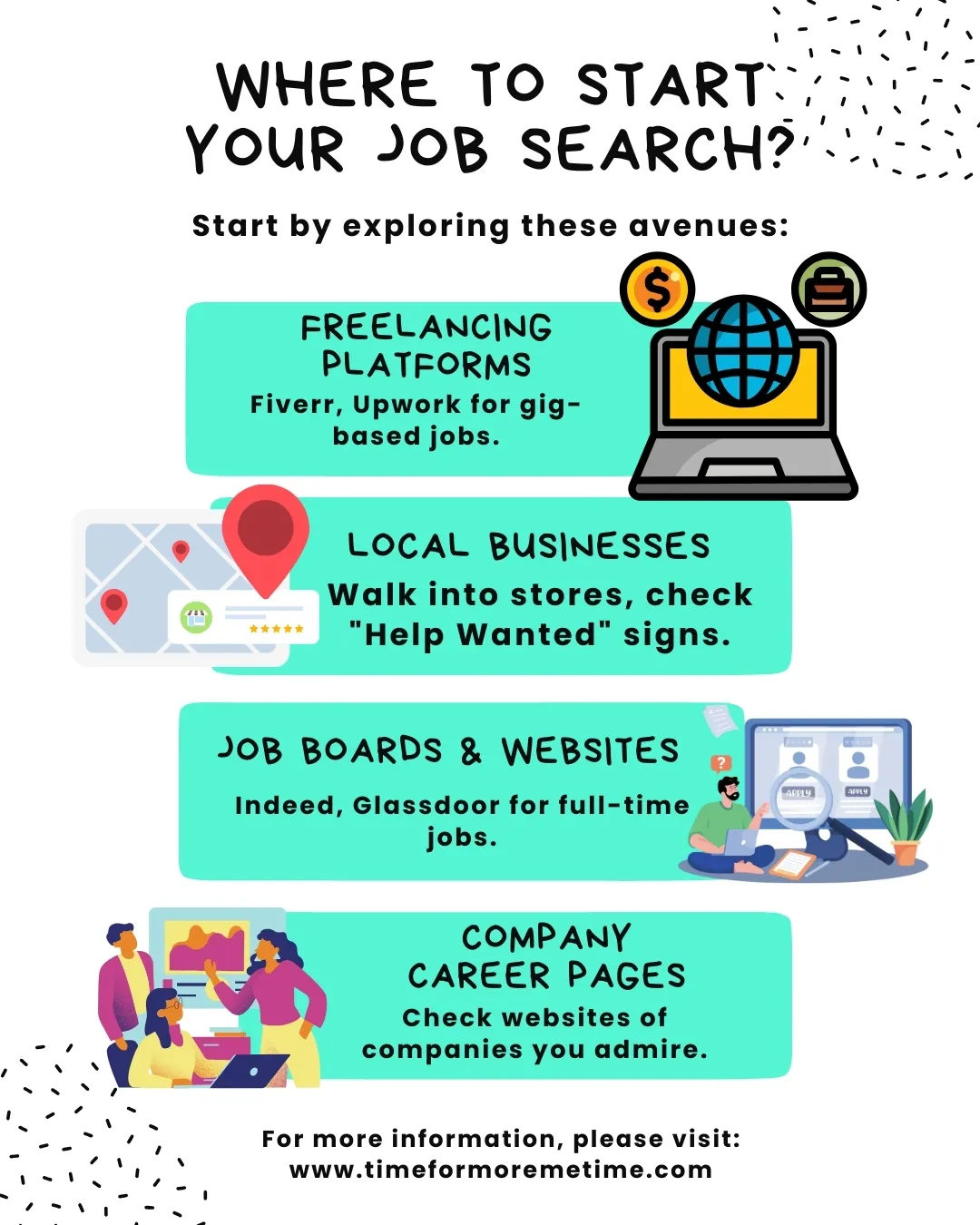
Now that you’ve completed the preparatory steps, it’s time to embark on your job hunt! There are numerous hunting grounds available, and the best places to search for jobs will depend on the specific one you’ve chosen to target.
If you’re interested in freelancing, platforms like Fiverr and Upwork are excellent starting points. These websites connect freelancers with clients looking for various services, allowing you to showcase your skills and find projects that match your expertise.
For those seeking positions in the service industry, consider exploring your local area. Head to the city or downtown and look for “Help Wanted” signs in shop windows or inquire directly at businesses.
Many service industry jobs are filled quickly, so being proactive can give you an edge.
Do note that these aren’t the only avenues for job searching. Online job boards and job search websites like Indeed and Glassdoor are fantastic resources for finding a wide range of job listings.
If you have a specific company in mind, don’t forget to check their career page on their website. Many companies post job openings directly on their sites, giving you a chance to apply for positions that interest you.
If you’re feeling overwhelmed or unsure about where to start, remember that Google is your friend.
Job hunting can be as simple as typing the job title you want, along with the phrase “hiring near me” or just be direct and type ‘jobs hiring near me.” Google will provide you with links to local job openings and websites that can direct you to available positions.
To refine your search further, you can add specific details, such as the salary range you’re looking for or particular skills you possess. However, keep in mind that the more specific you get, the narrower your results may become.
It’s all about finding the right balance to ensure you receive relevant job listings.
Another alternative is to ask friends and families for opportunities. Surely, one or two of them would have an idea of where you can get a job!
5. Apply For The Job
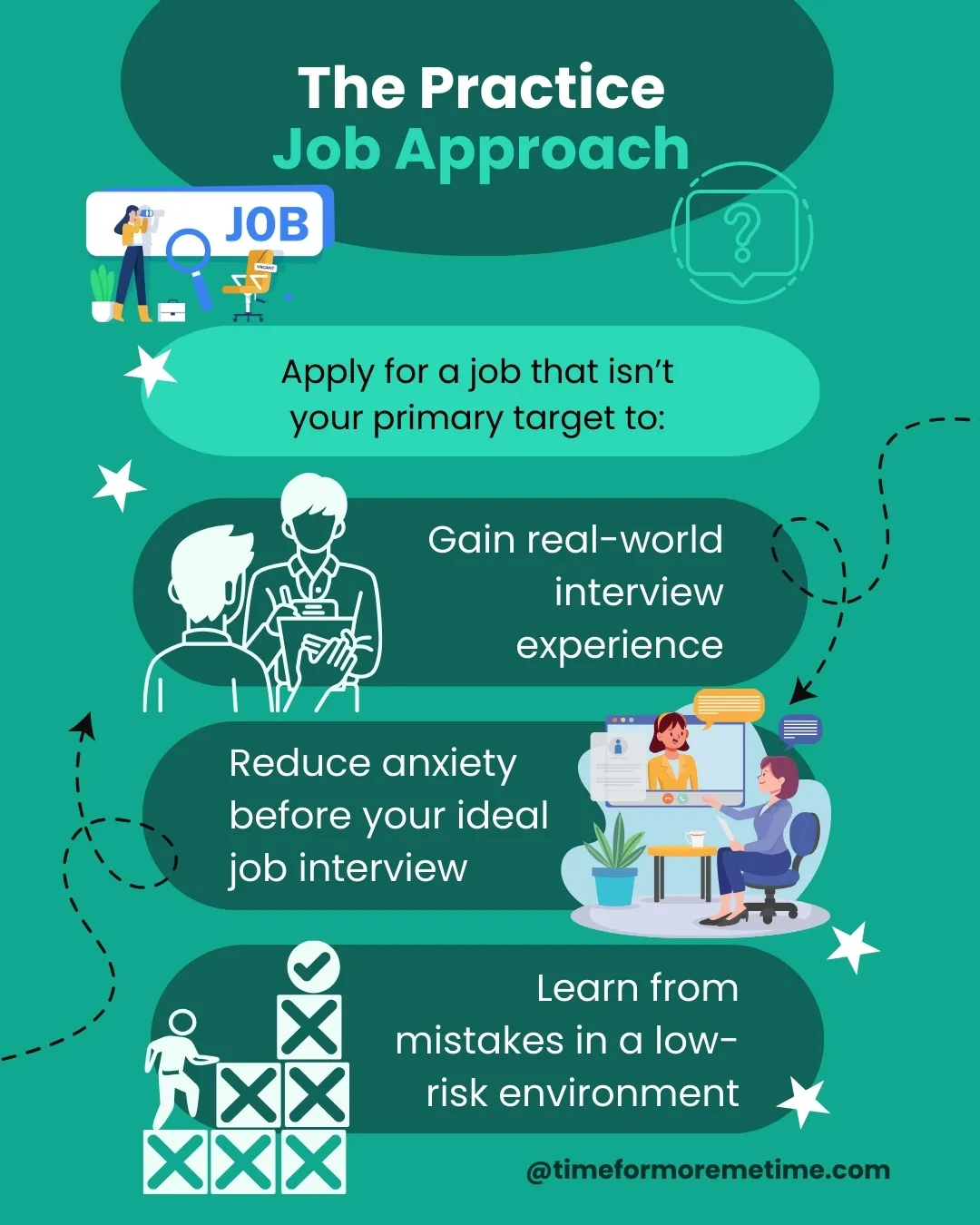
And here comes the most daunting part: applying for the job you’ve found. Are you feeling scared? Is this your first time? Do you need to practice? The good news is that it’s entirely possible to practice for interviews and get comfortable with the process.
As a disclaimer, this advice comes from my own experience. When I was targeting a specific position, I wanted to avoid feeling jittery during the actual interview. So, here’s what I did: I sought out another job—one that was similar but not my primary target.
I applied for that position with the full expectation that I would use the opportunity to practice my interview skills. It didn’t matter to me whether I succeeded or failed; the important thing was to get accustomed to the feeling of being interviewed.
Some might argue that this approach is a waste of time, but I see it differently. It’s a valuable experience!
Remember that one of the metrics that hiring managers often look for is how well an applicant performs in interviews. But how can you improve if you don’t take the plunge and apply, even if it means failing?
By practicing on actual interviews from other companies you’re not actually targeting, you wouldn’t risk failing on your target job in a company you chose! This is also a great way to build your confidence.
Now, if you happen to pass the interview for your practice job, it’s up to you to decide how to proceed. Can you see yourself enjoying the job you just applied for? Will it meet your needs and expectations? Think carefully!
Remember, you have the power to reject the offer if it doesn’t feel right for you. After all, it’s not just the employers who have the authority to make decisions; you do too!
6. Adapt After Failing
After applying for a job, there are typically two outcomes: you either get the job or you don’t. If you land the position, congratulations! You’ve successfully navigated the process.
However, even if you practiced diligently and felt confident that you aced the interview, there are times when the job simply isn’t the right fit for you. Sometimes, it feels like the universe conspires against you, leading to rejection.
And that’s perfectly okay! The real question now is: what’s your next step? Well, it’s time to go through the process again.
You need to reassess yourself, polish your resume even further, and clarify whether this is truly the job you want. Then, it’s back to hunting for new opportunities, practicing your applications, and submitting them.
This cycle can feel endless until you finally secure a job. However, if you find yourself repeating this process more than three times without success, it might be time to take a step back.
After all, repeating the same actions and expecting different results is often considered a form of insanity. So, pause and evaluate what’s going on.
At this point, seeking help is crucial. Not just from a post like this one, but from professionals who can provide guidance.
Consider reaching out to the American Job Centers (AJC). This organization offers career counseling, job search assistance, and a wealth of resources to help you find employment. Best of all, their services are free!
There should be an AJC location near you, ready to support you in your job search journey.
FAQs
Well, we’re almost at the end, and I’m sure you have some lingering questions. Let me do my best to address them!
What should I do if I don’t have relevant work experience?
If you find yourself lacking any form of work experience, don’t worry! Focus on highlighting your transferable skills gained from volunteer work, internships, or relevant coursework. If you don’t have any of those, maybe this is the right time to find—at the very least—volunteer work.
Also, showcase any projects or extracurricular activities that demonstrate your abilities and commitment. For example, if you led a team project in school or organized a community event, these experiences can illustrate your leadership, teamwork, and problem-solving skills.
How to hunt for jobs while staying motivated?
Staying motivated during a job search can be challenging, but it’s essential for your mental well-being. Start by setting small, achievable goals each week, such as applying to a certain number of jobs or networking with a specific number of professionals.
Additionally, seek support from friends and family who can encourage you and provide a listening ear. Don’t forget to take regular breaks to recharge and avoid burnout—engaging in hobbies or physical activities can help refresh your mind and spirit.
What are the common mistakes in job hunting?
There are several common pitfalls that job seekers often encounter. One major mistake is submitting a generic resume and cover letter without tailoring them to the specific job description. Also, failing to research the company and its culture can also lead to missed opportunities.
Moreover, neglecting to follow up after interviews or applications can leave a negative impression. Other mistakes include not preparing adequately for interviews, overlooking the importance of networking, and applying for positions that don’t align with your skills or interests.
Conclusion
There you have it! This post serves as a straightforward guide to help new job seekers learn how to hunt for jobs. I know, I know—some of these tips may seem like common sense!
However, I felt it was important to cover these basics because I truly believe that earning money begins with mastering the art of job hunting and successfully landing a position.
With so many young people struggling to find employment, I often wonder if they are fully aware of the steps involved in this process. To at least offer some assistance, I created this post to shed light on the essential elements of job searching.
If you found this information helpful and want more content like this—whether it’s about saving money, making the most of your time, or enhancing your financial literacy—be sure to follow this site. Additionally, check out my YouTube channel for more tips and insights.
Sources
- Photo: Unsplash: Andrew Neel

